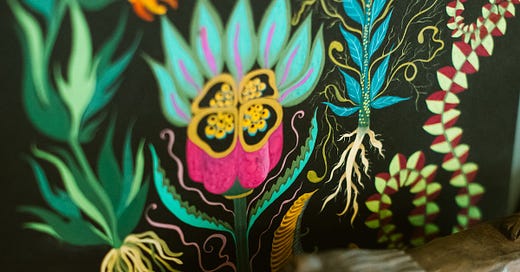Holding the Tension
Our culture—such as it is—is deeply afflicted by polarity and one-sidedness now. What if our capacity to hold the tension of these polarities inside of ourselves is one way out of this division?
Photograph by Cheryl Juetten
It’s really good for me to be discerning about my interactions with social media these days. It’s costly to be bombarded with so much in so short a window. I know my brain and nervous system wasn’t designed to navigate the onslaught, and darkly, that appears to be the point. With the death cult merchants at their helms, the major platforms’ motives couldn’t be more plain. Expend our attention. Disperse it. Draw us towards polarities, into silos, and dark eddies. Capitalize on our feelings of anguish, overwhelm, and isolation.
I’m afraid these aren’t anomalous outcomes, but the very design. (Barf.)
Still, I did see something that charmed me on a pass through Instagram the other day. A woman was gleefully teasing folks for speaking about community as though it were the second coming of the Messiah. “Oh! Community is coming! Community will save us!” she teased, saying something like, “You know community is work, right? You know you’re going to have to be in the room with people who don’t think exactly like you?”
Haha. I get it. There may be some real work and possibly discomfort required in order to move towards one another now. There isn’t a savior called Community coming down from the clouds. But that being true, what’s it like to put down our phones and draw something up from the earth in these polarized times? How might we equip ourselves to extend a disarming hospitality towards people who don’t look, act, or think like us. Not merely so that we might tolerate them, but maybe even love them.
Perhaps one way to start is by first practicing a radical hospitality towards our own inner contradictions and less than savory parts.
In 1954, the great doctor of the soul CG Jung was presenting at the Psychology Club in Zurich. The context was the Cold War, as the world watched a terrifying rivalry solidify between the Soviet Union and the West. Contemplating the nuclear threat, someone asked Jung, “Will we experience WWIII?”
“I think it depends,” Jung said, “on how many people can stand the tension of opposites in themselves.”
Let that one roll around in your body for a minute. Do you feel that? What happens when we imagine a capacity to hold opposing forces in ourselves?
First off, it’s important to recognize that polarized forces are present inside each of us all the time, just as they are in the culture and the body politic. As within, so without. We can deeply love our partners, for example, and be annoyed by them at the same time. We can be thrilled about a trip we’re taking, while a good part of us wants to stay home. We can be driven with ambition to succeed at a particular goal, while at the same time feeling an acute fear of exposure that halts our progress.
Both/And.
When we’re unable to hold the tension of opposites within ourselves, we disown the side of the polarity we don’t like. Unable to feel or allow it, we then project it outside of ourselves. Indeed, in these moments it’s as though we’ve affixed a projector to our faces without realizing it. Looking through the lens of the projector rather than through clear and compassionate eyes, we recreate our one-sided perspective in the world. As we see it, so it then appears. In seeing our unconscious creation, we then confirm our biases; indeed, we’ve received the very signal we sent out without realizing it.
But the more I’m able to hold the tension of opposing forces within myself, the less likely I am to create that tension in my life. I hold my grief and fear, for example, about my daughter’s imminent departure for college, quite possibly on the east coast. By not pushing these feelings away, I don’t need to sabotage the great joy, pride, and exuberance I feel about this momentous time in the life of my daughter and family. As I’m better at holding the tension of opposites in myself, I’m able to access a greater generosity towards not only myself, but those I come in contact with. I might even become an environment where someone can loosen their defenses and begin to hold the tension within themselves.
This is just the merest of introductions to what I believe is a revolutionary way of being, but I encourage you to contemplate some questions as you go about your day:
Is there a part of me I’ve disowned because I find that part unpleasant or unsavory?
Is it possible I’ve projected that unsavory part of myself onto another person and made them my enemy?
If I’m able to offer this part of myself hospitality and warmth, does my disposition soften towards my imagined enemy?
Some gentle food for thought on this New Moon Thursday.
With love,
Jules






Ah, community! The other "C word." I find the humor helps me navigate.